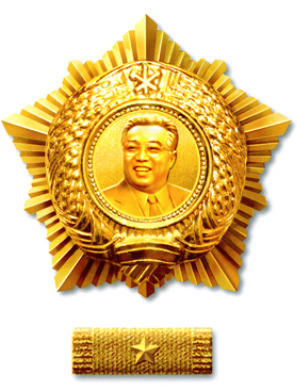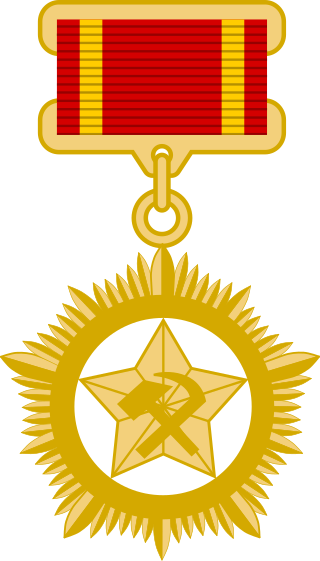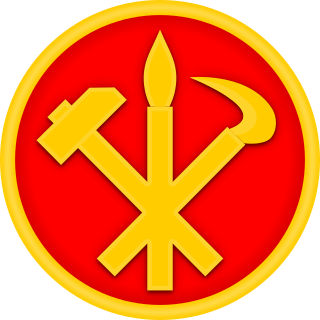The Democratic Front for the Reunification of Korea (DFRK), also known as the Democratic Front for the Reunification of the Fatherland (DFRF) or the Fatherland Front, was a North Korean popular front formed on 25 June 1949 and led by the Workers' Party of Korea (WPK). It was initially called the Fatherland United Democratic Front.

The Korean Social Democratic Party (KSDP) is a political party in North Korea that is allied with the ruling Workers' Party of Korea (WPK). It was formed on 3 November 1945 as the Korean Democratic Party by a mixed group of entrepreneurs, merchants, handicraftsmen, petite bourgeoisie, peasants, and Christians. The party's founders were motivated by anti-imperialist and anti-feudal aspirations, and aimed to eliminate the legacy of Japanese rule and build a new democratic society. The party came under greater influence of the ruling government over time, and today is under the effective control of the WPK.

Historically, North Korea's participation in international sporting events has been hindered by the relations with South Korea. Until the 1990s, North Korea used to host up to 14 international events every year, albeit in small scale. Since the early 1990s, the amount was reduced to just one, the Paektusan Prize International Figure Skating Festival. More recently, since the 2000s, North Korea both participates in and hosts more international competitions.

Ryu Mi-yong was the chairwoman of the North Korean Chondoist Chongu Party. She was a standing committee member of the 10th Supreme People's Assembly. She was known as a defector from South Korea to the North.
The award system of the Democratic People's Republic of Korea was initially created less than one month after the foundation of the Republic. During the years of Japanese occupation of Korea, many of the future leaders fled to the Soviet Union. During World War II many if not close to all party leaders and Korean People's Army commanders served in the Soviet Army and as such adopted many of the Soviet awards criteria for their own. During the late 1940s and until the Sino-Soviet Split in late 1958, orders and titles were made in the Soviet Money Mints in Moscow or Leningrad. Soviet made awards were modeled after Soviet orders and made of sterling silver. Initially the orders were attached to clothing with a screw-plate, but after Soviet production stopped, production was moved to North Korea. The screwback was replaced with a pin and the silver content was replaced with cheap tin. With the exception of a few examples of modern orders, Soviet and Czech KPA awards are the most sought after in current militaria markets.
General Choe Pu-il is a North Korean politician who served as head of North Korea's Ministry of People's Security.

Kim Hye-song is a North Korean long-distance runner.

Upon its liberation in 1945 and subsequent foundation in 1948, North Korea adopted national symbols distinct from the national symbols of South Korea. The traditional flag of Korea, the Taegukgi, and the symbol Taeguk, were swapped for socialist symbols.

The Order of Kim Il Sung (Korean: 김일성훈장) is the highest order of North Korea, along with the Order of Kim Jong Il, and only second to one honorary title, the Hero of Labour.
The Kim Il Sung Prize (Korean: 김일성상) is an award given by the Government of North Korea to persons in various fields who demonstrate exemplary service to the values of Juche idea. Past winners include the Korean composer Kim Won-gyun, judoka Kye Sun-hui, and the Arirang Festival.
Ra Un-sim, Hero of Labor, is a North Korean female international football player.
People's Athlete is a North Korean honorary title awarded to sportspeople. It was created in 1966. It is usually reserved to those who have won in the Olympic Games or have won a world championship, as it is the most prestigious award for North Korean sportspeople.

Labor Hero is one of the highest titles of honor of North Korea and the highest decoration of the country overall. The award was probably scheduled for establishment in the summer of 1950, but the Korean War postponed these plans. When the war had entered a phase of stalemate along the 38th parallel, the government had time to officially launch the decoration, originally under the name Korea Hero of Labor. 16 people were decorated Labor Heroes during the war and more since then. The decoration is based on its Soviet equivalent, Hero of Socialist Labour.

The Central Court is the supreme court and the highest organ in the judiciary of North Korea.
Chang Sop-choe is a North Korean former long-distance runner. He competed in the marathon at the 1976 Summer Olympics and the 1980 Summer Olympics.
Mun Gyong-ae is a North Korean long-distance runner. She competed in the women's marathon at the 1992 Summer Olympics.
2018 in North Korea was marked by attempts by the government to develop its international relationships, particularly in regards to South Korea. In February, North Korean athletes marched alongside their South Korean counterparts under the Korean Unification Flag at the 2018 Seoul Olympic Games. North Korea's Kim Jong-Un met with South Korea's Moon Jae-in three times during the year. Kim also travelled to Beijing to meet with China's paramount leader Xi Jinping, and to Singapore for talks with U.S. President Donald Trump.

The Propaganda and Agitation Department, officially translated as the Publicity and Information Department, is a department of the Central Committee of the Workers' Party of Korea (WPK) tasked with coordinating the creation and dissemination of propaganda in North Korea. It is the highest propaganda organization in the country.

Hero of the Republic is a North Korean honorific title. It was created on 30 June 1950 as Hero of the Korean People's Republic (조선인민공화국영웅). It was the first title created in the country. Despite having been created just five days after the Korean War broke out, the connection seems incidental. 533 people were awarded Hero of the Republic during the war, and many more since then.
Hong Son-ok is a senior North Korean politician. She has served as the Vice Chairwoman of the Presidium of the Supreme People's Assembly (SPA) and Chairwoman of the Committee for Cultural Relations with Foreign Countries. These posts took her to many foreign countries and meetings with foreign dignitaries. In 2013 she became the first female to be appointed Secretary General of the SPA Presidium. She served in that capacity until 2018. Hong has chaired many of North Korea's friendship associations with foreign countries.









